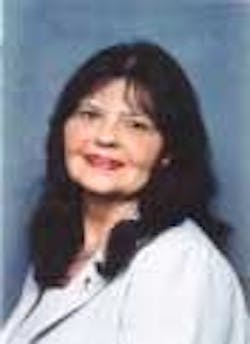Gathering the forensic evidence
Many hygienists have a common misconception about a little known fact of dental hygiene. They believe that in order to be involved in forensic dentistry, one has to be a dentist. Winnie Furnari, RDH, BS, is helping to dispel that myth. Her program titled, “Forensic Dentistry: The Role of the Dental Hygienist,” provides an overview of what hygienists can provide to benefit the public in this dynamic field.
Forensic dentistry is defined as the procedures done in the name of the law and in conjunction with the needs of law enforcement, for the protection provided by the law and the prevention of illegal acts. It covers horrendous acts of human abuse, including spousal, child, and elder. It also deals with mass disasters such as 9/11. Winnie’s programs delve into the startling statistics of abuse and how hygienists have the difficult but legal and ethical obligation to identify bite marks or other signs of abuse. It explains how dental hygienists can assist in mass disaster efforts, both pre- and post-mortem. It stresses the importance of keeping accurate, clear, and up-to-date documentation.
Winnie also discusses the negative aspects of working with mass disaster teams, namely the deep sadness one experiences in times of tragedy, and the options for help that are available to those so close to human suffering. She encourages participants to participate in various Web sites and organizations where hygienists can make considerable contributions to the forensic community.
Another important topic Winnie discusses is how practicing hygienists can help elevate the profession by participating in bioterrorism preparedness in our communities and workplaces. Winnie informs participants of the agents of bioterrorism and the signs and symptoms associated with bioterrorism events. Participants are also taught ways in which their private or public dental practices can play a role in treating sick and worried victims in the event of a disaster.
In her forensic dentistry program, Winnie explains the valuable role hygienists can play in gathering, collecting, and interpreting evidence for identification. Topics in the program include:
• Definition of forensic dentistry
• Areas of dental hygiene involvement: mass disasters, child/elder/spouse abuse, bite mark analysis, criminal/natural deaths and injuries
• Mass disasters: protocols, teams involved, ethics
• Mass disaster cases: U.S. Air flight 405 (March 1992), the World Trade Center Sept. 2001, American Airlines flight 587 Nov. 2001
• Dental hygiene involvement: documentation, volunteering, forensic organizations
• Bioterriorism: preparation, suspicions and response.
Winnie has long been interested and involved in forensics. As a member the N.Y. Society of Forensic Dentistry, she attended numerous lectures and conferences. From these experiences, she was invited to become an active member of a team. As a member of a forensic team, Winnie was activated immediately following the events of 9/11. After participating in the WTC identification effort, she felt she should share her years of experience with other dental professionals, especially those interested in forensic dentistry. Thus the program was born.
Winnie includes portions of her PowerPoint presentation in her handout. In addition to contact information, child abuse signs and symptoms, and a bibliography, she includes statistics and information for reporting abuse in specific geographic areas, along with information on the CDC for the bioterrorism portion. Some programs allow for a group activity, and there is always a question-and-answer period.
With a degree in fashion buying and merchandising from the Fashion Institute of Technology in New York, Winnie decided after marrying and raising her children that a career change was in order. She received her dental hygiene degree from Orange County Community College in Middletown, N.Y., and continued on to receive her bachelor’s in health sciences from Empire State College in Middletown, N.Y. She is currently working towards a master’s degree.
Along the way, New York’s chief forensic dentist, Dr. Jeffery Burkes, invited her to present a program on ethics, and her speaking career developed. She has presented to N.Y. State dental meetings, SADHA and component meetings, and ADHA meetings, as well as programs from Maine to Florida! She recently received confirmation that she will be lecturing at New York University’s baccalaureate program beginning in the spring semester 2005.
In addition, Winnie has received numerous recognitions from various organizations. These include: the New York City medical examiner, New York city council, the U.S. government, ADHA, DHASNY, NYSDA, ADA, Colgate, Hereaus Kulzer, and, most recently, an international award from the German Academy of Forensic Odontostomatology for her contributions to forensic science.
Despite the enormous gravity of the topics she discusses, Winnie always tries to lighten up her presentations with a story about her experiences. She is passionate about her family and husband of 32 years, Anthony. Anthony is jokingly called St. Anthony for his endless patience and support.
Winnie describes herself first as a survivor, then as empathetic and a hard-worker. She can be found in many aspects of dental hygiene practice, from private practice, to education, to committee work, to administration, to community outreach - anywhere she can make a difference. If she were not a hygienist, she would be a wealthy philanthropist who did worldwide missionary work in healthcare.
Winnie envisions forensics as a special interest group for hygienists. She would love to work on a certification process, granted by a recognized agency, to grant fellowship status to hygienists in forensics. Maybe with the advent of the advanced dental hygiene practitioner status, she may see this become a reality. It would be a distant memory from when forensics was only a “dentist” area.
Ann-Marie C. DePalma, RDH, BS, has been a clinical hygienist for more than 25 years and is a graduate of the Forsyth School for Dental Hygienists, is active in the Massachusetts Dental Hygienists’ Association, and is a Fellow of the Association of Dental Implant Auxilliaries and Practice Management. Ann-Marie has written articles and presents programs on dental implants, TMD, and developmental delays and can be reached at [email protected].

